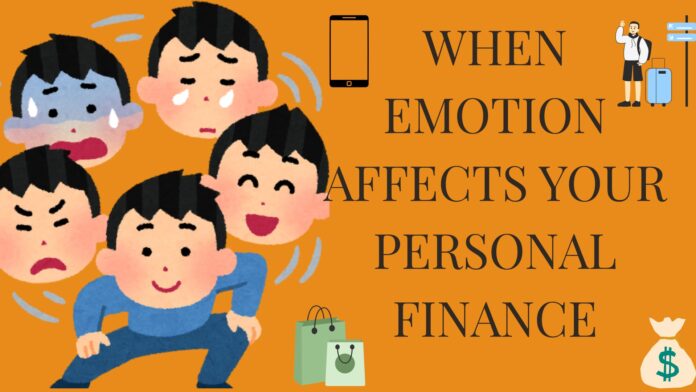Money talks. But what no one tells you is… money feels too.
We don’t spend, save, invest, or borrow in a vacuum. Our emotions are behind the scenes, pulling the strings. Whether it’s fear holding you back from investing, guilt making you overspend on your kids, or FOMO pushing you into risky crypto schemes, emotions silently shape your entire financial life.
The Emotional Side of Money
Money isn’t just math. It’s psychology. It’s relationships. It’s self-worth wrapped in numbers.
Ever bought something expensive to feel better after a tough day? That’s emotion.
Avoided investing because markets felt scary? That’s emotion.
Maxed your credit card for a wedding to impress relatives? You guessed it emotion.
Why This Topic Matters More Than You Think
Here’s the hard truth: your income, your investments, even your savings plan, can be flawless, but if your emotions are not in check, your finances will suffer.
Mastering money starts with mastering your emotions. Period.
Understanding the Connection Between Emotions and Money
How Our Brain Links Feelings and Financial Decisions
Our brain is wired for survival, not wealth creation. The part of the brain that processes fear and excitement, the amygdala, often hijacks logical thinking. That’s why even smart people make dumb money decisions when emotions take over.
Quick Glimpse: Common Emotions That Impact Money
✅ Fear
✅ Greed
✅ Guilt
✅ Excitement
✅ Overconfidence
✅ Anxiety
✅ Love
Positive Emotions That Can Shape Your Finances
1. Love and Overspending on Family
You love your spouse, your kids, and your parents. That’s beautiful. But love can also make you financially reckless, overspending on gifts, grand weddings, or endless support, even when your budget screams “STOP!”
2. Excitement and Impulsive Investments
A hot tip. A trending stock. A new-age crypto coin. Excitement clouds judgment. You act on impulse, thinking “This is it!” often burning your fingers.
3. Confidence and Smart Financial Growth
On the flip side, healthy confidence lets you take calculated risks, investing in yourself, your career, or long-term assets. Confidence with knowledge builds wealth.
Negative Emotions That Sabotage Your Money
1. Fear Leading to Inaction or Bad Decisions
Fear of losing money? You avoid investing altogether. Fear of market crashes? You sell in panic. Fear keeps your money stagnant or worse erodes it.
2. Guilt-Driven Spending
Parents often overspend on their kids to make up for a lack of time. Spouses overspend after fights. Guilt can blow a hole in your wallet.
3. Anxiety and Constant Money Hoarding
Some people, driven by anxiety, save obsessively never spending, never enjoying. Ironically, that too is unhealthy.
4. Greed and Risky Financial Behaviour
Chasing unrealistic returns? Falling for Ponzi schemes? That’s greed whispering false promises.
Real-Life Examples of Emotions Wrecking Personal Finances
The Story of Rahul: Fear of Investing Cost Him Years
Rahul, a 35-year-old engineer, watched friends invest in mutual funds and stocks. But he kept saying, “What if markets crash?” Result? 10 years later, his savings barely grew, while his friends built solid portfolios.
Priya’s Emotional Shopping Spree After Breakup
Priya, heartbroken after a breakup, turned to online shopping for comfort. Clothes, gadgets, random stuff, her credit card bill shot up ₹1.2 lakh in 3 months. Emotional spending?
Overconfidence Trap: How Sandeep Lost Big in Stocks
Sandeep doubled his money in stocks during a bull run. Overconfident, he poured all his savings into speculative stocks, without research. Markets corrected, and he lost 70% of his portfolio.
The Subtle but Deadly Emotional Triggers in Daily Life
1. Social Media Envy and FOMO (Fear of Missing Out)
Scrolling Instagram? Seeing luxury vacations, new cars, fancy gadgets? FOMO kicks in. You swipe your card or break your savings to “keep up.”
2. Peer Pressure and Lifestyle Inflation
Your friend upgrades to an iPhone 16 Pro Max. You feel left behind. Boom ₹1.5 lakh gone. Welcome to lifestyle inflation driven by emotions, not logic.
3. Emotional Blackmail in Family Finances
Parents emotionally nudge you to take loans for weddings or properties. Saying no feels like betrayal. But giving in can derail your financial health.
How to Recognise When Emotions Are Driving Your Financial Choices
Quick Self-Check Questions
- Am I spending to impress or express love?
- Is fear stopping me from making smart investments?
- Am I hoarding money out of anxiety?
- Did I buy this because I felt low or left out?
Emotional Spending vs. Conscious Spending
Emotional spending is reactive. Conscious spending is planned. Learn to spot the difference. It’s life-changing.
Practical Steps to Control Emotions in Money Matters
1. Create a Budget with Emotional Buffers
Factor in occasional emotional spending, a treat, a holiday, but within limits. Budget ≠ Restriction. It’s control.
2. Automate, So Feelings Don’t Interfere
Automate SIPs, EMIs, and savings. Take emotions out of monthly decisions. Future You will thank Present You.
3. Accountability Partner or Financial Coach
A neutral third party keeps emotions in check. Friends, spouses, or pros can stop you from emotional money blunders.
4. Learn the Pause Technique Before Major Financial Moves
Feeling excited or scared? Pause. Sleep on it. Major money moves need logic, not adrenaline.
The Role of Financial Literacy in Emotion-Proofing Your Finances
Knowledge kills fear. When you understand markets, debt, taxes, and emotions lose power over your money. Financial literacy = Emotional control.
Emotion Up, Intelligence Down
Intelligence Up, Emotion Down
Money and Emotional Triggers for Couples and Families
1. Money Fights and Emotional Baggage
Money triggers old wounds. “You never save.” “You spend too much.” Sound familiar? Awareness + honest conversations are key.
2. Healthy Money Conversations
Talk openly. Share goals, fears, and habits. Money is emotional; hiding feelings makes it worse.
Turning Emotions Into Financial Strengths
1. Using Fear as a Risk Management Tool
Fear keeps you cautious good. Use it to avoid scams, over-leverage, or blind risks.
2. Channelling Excitement for Long-Term Wealth Creation
Excited about a goal? Use that energy to invest, upskill, grow, not splurge.
Conclusion: Mastering Your Emotions = Mastering Your Money
Money success isn’t about earning more or finding magic investments. It’s about winning the daily mental game. Emotions will always be there, but with awareness, knowledge, and discipline, you stay in control.
Master your emotions, and you’ll master your finances. That’s real wealth.
FAQs
1. How do emotions affect investing decisions?
Fear, greed, and excitement often push people to avoid investing, panic-sell during market dips, or chase risky schemes without research.
2. Can fear of losing money ever be good?
Yes. Healthy fear prevents reckless decisions. But excessive fear stops you from building wealth. Balance is key.
3. What are the signs of emotional spending?
Buying things to feel better after stress, boredom, or comparison is a classic sign. If spending feels impulsive and followed by regret, it’s emotional.
4. How can couples manage emotions around money?
Open communication, shared goals, and respecting each other’s money mindset help. Consider joint budgeting or a financial advisor.
5. Is it normal to feel anxious about finances?
Completely normal. But constant anxiety that affects sleep, relationships, or decisions needs attention, maybe even professional help.
Other articles- Money & Relationship: Money’s Role in Family Life
Young Couple’s Money Issues & Solutions


